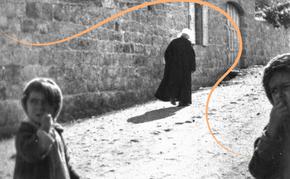The views expressed in our content reflect individual perspectives and do not represent the authoritative views of the Baha'i Faith.
The Baha’i Faith began in Persia in the mid-19th century, but spread rapidly to the global West, including Europe and North America. In Germany, however, the Nazis tried to stop it.
The establishment of the Baha’i Faith in Germany began in 1905, when a small group of Baha’is who brought the religion with them moved from the United States.
Two people in that group were originally German: Edwin Fischer and Alma Knobloch. Dr. Edwin Fischer, a dentist, emigrated in 1878 from Germany to New York, became a Baha’i there, and then returned to Stuttgart. An enthusiastic Baha’i, Dr. Fisher mentioned the Baha’i teachings often, including to his patients. The other German Baha’i, Alma Knobloch, became a Baha’i in the United States in 1903 and arrived in Germany from her family’s home in Washington, D.C. in 1907. Soon Germans began to become Baha’is, forming the first Baha’i Local Spiritual Assembly in 1908.
Five years later, in 1913, Abdu’l-Baha, the appointed Head of the Faith, and son of the founder, Baha’u’llah, traveled to Stuttgart, Esslingen, and Bad Mergentheim, solidifying the religion’s place in Germany.
RELATED: The Impact of the Nazis on Today’s World
In the aftermath of World War I, the Baha’i community in Germany continued to grow, becoming more active and prominent, as evidenced by their establishment of a publishing house for Baha’i works and the coordination of national conferences. The Faith grew and spread, which led to Baha’i Local Spiritual Assemblies being elected in many German cities and towns.
This momentum would start to shift, however, as early as 1936, when Baha’i businesses in Stuttgart were vandalized and Baha’i business owners threatened, echoing the initial Nazi regime’s prejudice against Jews – since many of the new German Baha’is came from Jewish backgrounds. In 1937, the Nazi SS Reichsfuhrer Heinrich Himmler, one of the chief architects of the Holocaust, issued an order banning the Baha’i Faith and all its institutions due to its “international and pacifist tendencies.”
While Baha’is do not involve themselves in partisan politics, the Baha’i teachings definitely do call for an end to war and the unity of all nations, as Abdu’l-Baha declared in his writings:
… the purpose of the Manifestation of God and the dawning of the limitless lights of the Invisible is to educate the souls of men, and refine the character of every living man – so that blessed individuals, who have freed themselves from the murk of the animal world, shall rise up with those qualities which are the adornings of the reality of man. … the portionless should gain their share of the boundless sea, and the ignorant drink their fill from the living fount of knowledge; that those who thirst for blood should forsake their savagery, and those who are barbed of claw should turn gentle and forbearing, and those who love war should seek instead for true conciliation; it is that the brutal, their talons razor-sharp, should enjoy the benefits of lasting peace; that the foul should learn that there is a realm of purity, and the tainted find their way to the rivers of holiness.
Himmler’s decree sparked increasing persecution of the Baha’is – the Nazis tore down several Baha’i memorials, confiscated or destroyed all archives and most private books, and eventually began arresting members of the Faith’s governing body in Germany, the National Spiritual Assembly, in 1939.
Additional mass arrests occurred in 1942, with some German Baha’is sent to concentration camps and their eventual death. Jailed Baha’i leaders were held on trial in Darmstadt in 1944, with clear indications that the verdict was pre-determined. Despite their overwhelming defense, the Nazi government found all the followers guilty, charging them significant fines and ordering the disbandment of all Baha’i activities and fraternization.
RELATED: Lidia Zamenhof, Selfless Baha’i Hero
The history of the Baha’i Faith in Germany, especially before and during World War II, is relatively sparse, including for those who are themselves Baha’i. The government destroyed the vast majority of administrative documents, published works, and personal writings during this period, leaving a smaller body of evidence to reflect on. However, a few harrowing and tragic stories of the persecution of Baha’is in Nazi Germany are available today through letters, eyewitness accounts, interviews, and memoirs. By studying these specific instances of persecution, including arrest and murder, one can understand the often-overlooked treatment of minority religious groups under Hitler’s regime.
The victims’ commitment to the primary Baha’i principles, and their refusal to disengage in Baha’i activities, exemplified a practice of faithful dissidence to a system that opposed their beliefs. Himmler and the Nazi regime were threatened by the Baha’is desire for peace and international unity – but despite their repression and their cruelty, could not halt the German Baha’is pursuit of those goals.

















Comments
Sign in or create an account
Continue with Facebookor